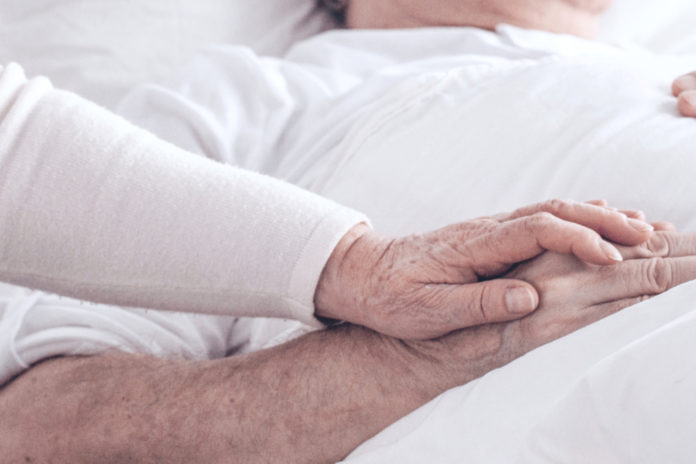The end of life for anyone can be a delicate, sometimes taboo topic. Yet, discussing end of life care can help the entire family feel more prepared and more at ease about dealing with it.
Whether a loved one is terminally ill, has dementia, or is simply elderly, there are some end of life symptoms and signs of approaching death to be aware of in order to prepare properly.
This short, empathetic guide can help ease some of the undesirable anxiety associated with end of life. And although death is inevitably sad, there are many ways to care for loved ones in their final days or hours to allow them to pass as peacefully as possible.
What Are Common End of Life Symptoms?
End of life symptoms can generally fall into two categories- physical and mental/emotional.
Many physical symptoms will correspond with one’s specific state and comorbidities such as heart disease, stroke, cancer, and any other chronic or terminal illness.
However, for a loved one without a specific chronic illness or one that is more managed, end of life care physical symptoms could look like:
Shortness of Breath or Breathing Abnormalities
Dyspnea, otherwise known as shortness of breath, is one of the most common physical end-of-life symptoms. As one’s body begins to shut down, breathing may sound louder and more labored.
Thankfully, simple treatments or exercises such as meditation, deep breathing and relaxation techniques, medications, and oxygen machines can provide relief when needed.
Decreased Appetite and Thirst
Another very common physical symptom, lack and loss of appetite tends to afflict many people towards the end of their life as their body no longer needs (or wants) the nutrition and energy that food and water provide. Even though this is very normal, it can be distressing for family members since feeding tends to be one of the most integral parts of caring for elderly loved ones in the first place.
However, decreasing food and water is a natural phenomenon that may allow an elderly loved one more peace and comfort. Furthermore, research tends to show that forcing “normal” food intake and/or artificial nutrition does not significantly prolong life and rarely enhances the quality of the final days, many times only causing more distress and discomfort.
Clarifying all feeding and nutrition choices within end of life care with all decision-making loved ones assures that true wishes and beliefs are respectfully honored.
Nausea & Vomiting
Whether due to medications or the natural dying process, nausea with or without vomiting is quite common. And although this can be a troubling (and messy) side effect of nearing the end of life, helping a loved one manage it appropriately is a solid way to show them care.
Natural remedies like ginger or peppermint tea and certain anti nausea medications can help mitigate some of the unpleasantries.
Constipation and/or Diarrhea
Unfortunately, these somewhat uncomfortable symptoms are also frequent and most common. And however uncomfortable it is for the caregiver, the dying loved one is even more so. Therefore, it is good practice to show compassion and understanding during these difficult times.
Constipation and diarrhea can be a direct side effect of a medication or due to lack of activity, decreased fiber and fluid intake, and natural disease processes. Because different root causes require different treatments, it is best to consult with their doctor for the best treatment approach.
Incontinence
The urinary system, just like the digestive system, tends to slow or stop functioning towards the end of life. Many elderly folks lose their ability to fully manage their bladder ability and some are too weak to physically make it to the bathroom or sit upright for a prolonged period of time.
Creating a safe plan with the loved one and qualified health practitioner is a good idea. Mental and emotional end of life symptoms may correspond to specific disease states as well. However, a few typical ones include:
Anxiety
Anxiety may arise at various times of the dying process such as during an episode of shortness of breath or while contemplating the unknown. While anxiety is an unpleasant feeling, it is completely normal and can allow for profound conversation about one’s life and what is to come.
Loved ones can ask their dying family or friend what soothes and comforts or even distracts them and then provide that accommodating care.
Withdrawal From Family and Life
Oftentimes, a dying person turns inward during the last days of their life. This can cause them to detach from the world, including friends and family, hobbies and interests, and food or other basic survival activities.
Respecting and meeting loved ones’ needs during this difficult time can be comforting to them, despite many folks’ desire to continue prolonging their dying loved one’s regular life.
Dementia/Delirium
Perhaps one of the most disconcerting symptoms, dementia or delirium can be caused by disease processed, decreased oxygen to the brain, medications, dehydration or other reasons. They may seem confused, lost and disintegrated from reality and begin incessantly picking, itching, or any other disturbing gesture.
If delirium morphs into hallucinations, they may need additional medical care to help ease and calm them. In the meantime, reminding them of who you are, how you know them, and staying calm will help.
How to Support & Care for Someone Near Death
There are many different ways to support and care for someone as they near death but the best way is to simply honor the dying loved one’s wishes and beliefs. The concept of dying can evoke a variety of feelings and emotions, and it is respectful to honor their desires.
While some elderly will require a service such as hospice or in-home nursing professionals, others may desire to pass peacefully in the comfort of their own home alongside family. Asking loved ones how they feel about death and even how they want to die can elucidate their wishes in advance, creating a more seamless process in the long run.
Other things to ask a loved one before they pass include what they want to be wearing, what they want to be surrounding them, about sentimental traditions, who they want near and anything else you feel appropriate.
Specific Supportive Approaches
Sometimes, a dying person may feel more worried about leaving behind loved ones more than themselves. They may feel overwhelmed about which of their children will fare worst, what is going to happen to savings, inheritances, and anything money, who will care for their pets, and much more.
Thus, it can be prudent to have upfront conversation about these topics beforehand, when possible. Not only asking questions about exactly what they desire, but also offering assurance that their most prized materials and beloved loved ones and furry friends will be wonderfully cared for is sensible.
As pain is a common end-of-life symptom, it is also important to ask them how they want it managed. Many experts believe that caring for someone who is dying should focus on relieving pain, so it can feel empowering to plan ahead.
Furthermore, making the dying loved one as comfortable as possible shows admirable support. Comfort may look like:
- Close physical touch
- Playing their favorite music
- Reading them a book
- Watching a vintage movie or TV show
- Sitting near a cozy fire and just being with them
Towards the end of life, spirituality may be or suddenly become important. Although spirituality can include Religion, other times it may simply mean discussing the the following:
- The meaning of life
- What they believed their purpose to be
- Drafting apology or forgiveness letters
- Ending disagreements with others
- Resolving unsettled manners
- Connecting with a higher power
Again, being respectful and supportive will help ease them and allow them to make peace at the end of their life.
Sharing memories of meaningful times is another way to support folks at the end of their life. Remembering all the good times is not only comforting, but a great way to relish in gratitude and appreciation of all that life can offer.
Conclusion
Dying is a sensitive topic that our culture often prefers to avoid discussing, even though it would be prudent to do more. When possible, planning or at least talking about dying loved one’s wishes, thoughts, and feelings about death can alleviate stress.
Finally, being able to recognize the signs and symptoms of end of life can empower you to provide the best support and ensure their quality of life remains high through the final moments.
References:
Morrow A. 12 signs that someone is near the end of their life. Verywellhealth.com. http://www.verywellhealth.com/common-symptoms-at-the-end-of-life-1132515.
Providing care and comfort at the end of life. Nih.gov. http://www.nia.nih.gov/health/providing-comfort-end-life.






